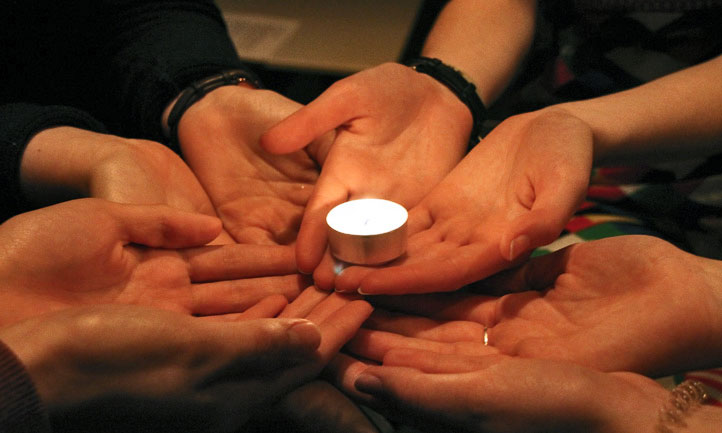
We each grieve differently, which makes it so hard to grieve together. We all mourn for the same person in unique ways, because our relationships are individualized. I have learned after multiple losses and working with many families through their various losses that each circumstance is unique and deserves, if not demands, individualized responses, and they are all okay.
In 2010, we lost our firstborn daughter at the age of ten to cancer. Our entire family was shaken as she was the first grandchild as well as the first significant loss in our family. Add to it the unnatural order of child loss versus adult loss, everyone was impacted by her death. We mourned deeply for her as her parents, but so did our entire family and community of friends and supporters. Some of us expressed deep anger and resentment at such a seemingly unnatural loss. Some felt betrayal by God, how could He love her so and take her from this world? How could He love us and leave us to mourn so deeply? Some experienced fear, as the reality of the frailty of life was so incredibly real at that moment. Some were afraid to grieve with us, as they felt they weren’t worthy to pour out the intense tears we released as her parents. We all felt deprived of a lifetime with this little girl that lit up a room. We all felt cheated in a sense, and we cried for the life not lived and enjoyed for many years.
In 2014, we lost our matriarch, my grandmother, at the age of 75 after a lengthy battle against Alzheimer’s disease. We were all deeply saddened by her passing, yet our grief was diminished by the mercy we felt in her passing. We all knew she had been trapped in her body as her mind was fleeting away. Those at her bedside will never forget those final days and hours before her passing, but each agree that her death was a release from the hell she lived in each day. We miss that woman dearly, but we don’t miss the agony she endured. We didn’t question God, yet we thanked Him for taking her home after a long and fruitful life. We recalled memorable stories from her lifetime, and we reflected with fondness.
In 2016, our Rock, my grandfather, died after a brief illness at the age of 77, and we were all floored once again. We didn’t expect this illness, and we didn’t expect him to succomb to sepsis after an 11 day ICU stay. Sitting by his bed in those final days, we were able to capture some of precious moments with him, appreciating the frailty of the situation, but really hoping for a better outcome. After receiving visitors for several days, he asked his nurse for no more visitors, including family, and he died after his heart stopped in the early morning hours. Some of the same feelings set in again, and frustration, anger, confusion, and betrayal settled among the family members.
In 2017, we lost my husband’s grandmother at the age of 91 after a long battle with dementia. Again, we were deeply saddened, but we were all relieved that she was released from her suffering. We didn’t feel the same level of anger, hurt, or pain that we experienced in other losses.
In 2018, we lost our second daughter at the age of thirteen after a battle with cancer. Pain, hurt, sadness, and grief over a life not fulfilled consumed the hearts of many who loved her. While we have learned to endure the hurt of losing close loved ones, the children make our hearts ache slightly more and encourage more questions of “why?” than other losses.
In 2019, within three weeks, we lost both of our mothers. My husband’s mother died suddenly from a heart attack after battling heart disease for many years. Just over three weeks later, my own mother died suddenly after a short illness, likely meningitis and sepsis from a mild infection after an outpatient medical procedure. Our families have both been impacted by this losses, especially so close together. In one we have fewer questions, but we still mourn. In the other, we can’t help but wonder “what if” and we feel slightly blind-sided.
What we have noticed in all of these devastating losses, is that we as a family have grieved together, but we have grieved differently. Each situation commanded different responses, but even within each, the individuals responded in very unique ways.
There is no right or wrong way to grieve, but it does impact our collaborative grief tremendously. How do we, as a family, mourn for the same person, when we each have a different loss and a different emotional response? Some want to get angry and find someone to blame. Some want to run and hide from the loss. Some want to remove memorabilia to minimize the impact of their loss. Some want to hold onto everything exactly as it was to savor the last few memories as possible. None of these are wrong, yet they cause the greatest contention in families after a loss.
Each person will mourn in their unique way and time. I have always felt the need to address business matters first, as a distraction, but then to allow myself as much time as needed to mourn without leaving matters undone. I am the type that will leave everything untouched so that I can “capture” it all when my mind is less cluttered. I process the business before the personal nearly every time. Others need the space to pull themselves together before they can deal with the emotional burden of others. Neither of us are wrong, and both should be honored when we grieve “together”.
The loss also impacts how we grieve. A sudden or unplanned loss usually leads to more confusion, disorientation, and shorter tempers. Anticipated loss will leave loved ones with more peace, yet often times a level of guilt for feeling relieved at the finality of the passing. The familial order will also impact how loved ones mourn. The natural order is to anticipate the oldest and furthest generations to depart sooner than the younger or youngest generations. Lengthy illness and sudden deaths both create different types of mourning as they afford different opportunities for goodbyes and final expressions of love.
Give everyone the proper space they need to grieve. Be respectful of the emotional needs of everyone impacted by the loss. Give yourself some space to grieve in your own way, and don’t expect each loss to impact you in the same way. There is no accurate grief gauge, and any handbook written is not going to be right in every situation. Be gentle. Love unconditionally. Celebrate the life. Mourn the loss.

